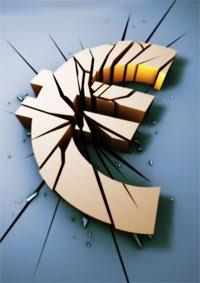 |
A man walks past graffiti which reads "rob to gain money"
on a wall of the central bank of Greece |
Last week, Medical Service Limited, a small Athens’ supplier of medical equipment that can no longer afford to pay its employees, received what should have been a blessing: an order from one of the city’s hospitals for a heart monitoring machine.
But after thinking it over, Yannis Stamos, the company’s co-founder, turned the customer away. Filling the order would have meant reaching into Medical Service’s own pockets to cover the €35,000 cost of such a machine, since Greek banks have stopped lending and the company’s German suppliers now demand pre-payment in cash.
Even if it could foot the bill, Medical Service would then have to hand over thousands of euros in sales tax to the Greek government within a month – long before any hospital is likely to pay.
“It’s a terrible situation,” Mr Stamos says. “Everything is frozen. The economy is dead, and no one is paying anyone.”
Medical Service is but a snapshot of what is happening to businesses across Greece as the economy’s gears grind to a halt. After sputtering through four years of recession, most commercial activity has all but ceased over the past six weeks as the country endured two nail-biting elections with its future in the eurozone hanging in the balance.
The political paralysis has both quickened the outflow of deposits from Greece’s teetering banks and put on hold an EU-funded effort to recapitalise them. Business leaders say they can no longer obtain the most basic credit – even when they boast solid order books.
Making matters worse, the government, which controls much of the economy, has stopped paying its bills. As of last month, it owed nearly €7bn to the private sector.
A €174bn EU bailout was supposed to help, but it has had negligible effect on the real economy, since most of the funds leave the country as soon as they arrive to repay foreign creditors.
“We have got to a point where we’re at a complete standstill,” said Constantine Michalos, the president of the Athens Chamber of Commerce. “The first thing a coalition government has to do is recapitalise the Greek banking system.”
The chamber’s own study reveals that 68,000 Greek businesses closed over the past 17 months and it expects a further 36,000 to close in the next 12 months. It foresees the economy will shrink a further 7.8 per cent this year – worse than the 6 to 6.5 per cent decline forecast by most economists. Even tourism, a typical redoubt of the Greek economy, is suffering as the political uncertainty has led holidaymakers to cancel bookings.
“The liquidity problem of the banks coupled with the state’s difficulty in paying its obligations for the past year has created ripple effects in the economy and everyone is feeling the effects,” said Thimios Bouloutas, the chief executive of Marfin Investment Group, a Greek holding company that owns hotels, an airline, private hospitals and a restaurant chain.
Some of those effects are obvious. With Greek pharmacists owed €370m by government insurance schemes, for example, some medications have become scarce and patients now have to pay the full cost of prescription drugs.
Others are less so. One Athens executive said his company had begun shopping for a new data centre outside Greece, amid fears that the country will suffer rolling blackouts this summer because of debts owed to the main utility.
The executive declined to be identified because the company does not want foreign customers or potential investors to know that it is based in Greece. “It’s quite sad that we’re doing that but it’s reality,” he said.
The cash crunch also appears to be forcing Greek companies to drop European suppliers and turn to Chinese competitors because they are willing to offer credit.
Dimitris Papanikolaou, vice-president of Neon Energy, which installs solar panels, said this factor – not cost – was the main reason he increasingly bought materials from China instead of Germany. At Medical Service, Mr Stamos has done likewise, switching to Chinese ultrasound machines.
In many ways, Mr Stamos embodies the enormous progress Greece has made in just a few generations – as well as the calamity it now faces. His father delivered goods by donkey on the island of Andros.
After settling in Athens, the son launched his company with a partner and a bank loan in 1991. His daughter studies economics at Athens university.
Late payments by Greece’s public hospitals have been a chronic challenge requiring a sympathetic banker.
Two years ago, the government paid €1m in arrears to Medical Service in the form of bonds. That seemed like a reasonable deal – until the country’s latest EU bailout led to a 50 per cent “haircut” for those securities.
In March, Mr Stamos stopped paying regular salaries to his eight employees and reduced their hours. Like other Greek executives, he is hoping that a new government will emerge this week, and then begin settling its bills. “I’m an optimist,” he said.
Pakistan Cyber Force



![Pakistan Cyber Force [Official]](http://feeds.feedburner.com/PakistanCyberForce.2.gif)




















